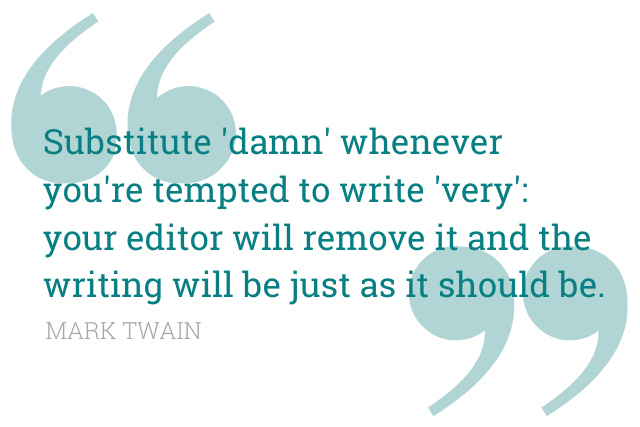
There are words and phrases in the English language that are indicative of poor writing style.
Intensifiers like "very" actually weaken your writing, and hesitant words like "just" or "maybe" make you sound unconvincing. Words like these are fine in moderation, but when overused they can undermine your ideas.
ProWritingAid's Overused Words Check flags problematic words and phrases commonly overused by writers and helps you to eliminate them. As you work through them, you will be begin to recognize and avoid using them in the first place.
The report will also show you the other words that you have overused, allowing you to get to know your own writing quirks.

How to Use ProWritingAid's Overused Words Report
Use ProWritingAid’s Overused Words Report to highlight all of those words that you don't want to overuse in your text. We’re not, of course, suggesting that you need to cut or replace all of them; rather, they just require a little extra re-examination to make sure that they are your best option.
To see your overused words, select the 'Overused' icon on the ProWritingAid toolbar. You will then see a menu to the left of your screen that looks like this:

In the menu, you'll see a list of your overused words. Hover over any word to bring up the navigation bar, as above. You can use the arrows to the right of the bar to jump between highlighted words in your document. This allows you to move through your writing efficiently, replacing words where necessary.
If you are happy that a word isn't overused, you can click on the Eye icon to hide highlights for that word in your document.
What Are Overused Words
Most of the words we flag fall into four main categories:
1) Too Wishy-Washy
Words like “could”, “might” and “maybe” are indefinite in their meaning.
“I could bring a salad to dinner” feels hesitant and unsure, whereas “I will bring a salad to dinner” feels resolute.
If your writing is peppered with these non-specific words, it will feel unconvincing. Try to limit your use of these undefined words to times when they are necessary and replace them with definite words when you are able.
2) Telling Rather Than Showing
Words like “knew”, “felt” and “saw” tend to be indicative of “telling” rather than “showing”. Instead of saying that “John knew that Jason was lying”, say "Jason avoided John’s eyes as he stammered ‘I don’t know where it is’." If you use too many “telling” words, your writing will be less evocative. Read more about the “Show, don’t tell” rule here.
3) Depending on Intensifiers Instead of Finding Stronger Words
Intensifiers like “very”, “so” and “really” add little to your reader’s understanding. Writers use them when they are trying to give strength to a dull word. Instead, replace your weak words with something strong enough that you don’t need the “very”. Instead of saying she was “very pretty”, say she was “stunning”. Instead of saying it’s “so hot”, say it is “stifling”.
4) Nonspecific Words
Some of the most common words in English are nearly meaningless. If someone reads a book and says it was “interesting”, that tells you almost nothing. Was it well-written? Was the argument convincing? It’s not even clear if they enjoyed reading it. Interesting could mean a million different things. Where possible, choose words that have precise meanings and talk about specifics. Your writing will be much more compelling.
